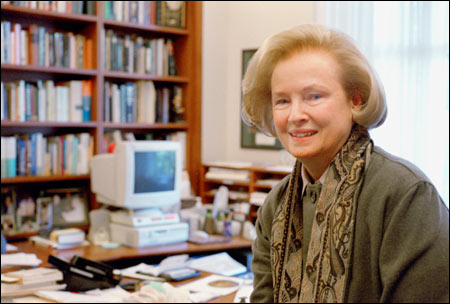Glendon wins Bradley Prize
Law School Professor wins inaugural award for outstanding achievement

Law School Professor Mary Ann Glendon, an expert on family and human rights law, was one of four winners of the first Bradley Prize, a new $250,000 award given for achievements that promote “liberal democracy, democratic capitalism and the vigorous defense of American institutions.”
Glendon, the Learned Hand Professor of Law, has received acclaim for her work on moral reasoning, cultural politics, the impact of feminism on the status of women, and the subordination of law to rights.
Glendon, who says her work is inspired by Catholic social thought, said she was surprised at learning she had won the award. She had heard that she had been nominated, she said, but didn’t think she’d win.
“I really wasn’t prepared for this individual award,” Glendon said. “I was absolutely amazed.”
The Bradley Prizes, announced Sept. 22, will be awarded at a ceremony at the Library of Congress on Oct. 7. The prize’s creation was announced by the Lynde and Harry Bradley Foundation last spring because the foundation believes it is important to recognize and reward outstanding achievement to encourage others to strive for similar excellence.
“These outstanding individuals are being recognized for achievements that are consistent with the mission statement of the foundation, including the promotion of liberal democracy, democratic capitalism, and a vigorous defense of American institutions,” Bradley Foundation President and Chief Executive Officer Michael W. Grebe said in a statement announcing the prizes.
The other three winners are all Harvard alumni, including Leon R. Kass, the Addie Clark Harding Professor in the Committee on Social Thought at the University of Chicago; nationally syndicated columnist Charles Krauthammer; and Thomas Sowell, the Rose and Milton Friedman Senior Fellow in Public Policy at the Hoover Institution on War, Revolution and Peace.
Glendon teaches in the areas of human rights, comparative law, constitutional law, and legal theory. Her most recent book, “A World Made New: Eleanor Roosevelt and the Universal Declaration of Human Rights,” tells of Roosevelt’s work framing the United Nation’s declaration of rights.
Glendon has been a professor at Harvard Law School since 1986, when she was named professor of law. She was appointed Learned Hand Professor of Law in 1993.
Glendon has served as an adviser to the Vatican in several capacities, leading a Vatican delegation to the International Women’s Conference in Beijing, and serving on the Pontifical Council for the Laity, the Pontifical Academy of Social Sciences, and as a consultant to the Pontifical Council on the Family.
Glendon also serves on the President’s Council on Bioethics, which considers ethics in such cutting-edge areas as cloning and gene research. Glendon said she’d like the council to delve more deeply into the ethics of resource allocation within the health care system. How we spend increasingly scarce health care dollars may ultimately have more impact than cutting-edge science that affects just a few.
Glendon is currently organizing a conference for next spring called “Intergenerational Solidarity, Welfare and Human Ecology,” that will examine how changing family relationships are affecting the welfare state or, in nations without significant welfare programs, how they’re affecting the care of the very young and the very old.




